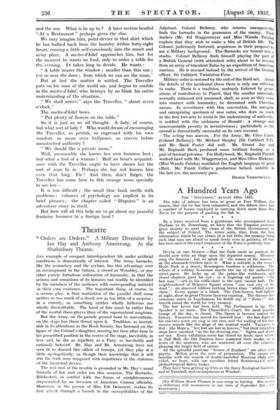Theatre
" Orders are Orders." A Military Diversion by Ian Hay and Anthony Armstrong. At the Shaftesbury Theatre.
AN Y example of compact interdependent life under artificial conditions is dramatically of interest. The Army barracks, like the monastery and the asylum, has this advantage over an encampment in the Sahara, a crowd at Wembley, or any other purely fortuitous collocation of humanity, in that the actions and sensations of its inmates can readily be identified by the members of the audience with corresponding material in their own existence. The important thing, of course, in a serious play, is that realization of the parallel shall come neither as too much of a shock nor as too little of a surprise ; in a comedy, as something neither wholly ludicrous nor wholly discreditable. The hand of fate must be rather that of the mortal chess-player than of the supernatural magician.
But the Army, on the parade ground born to conventions, on the stage has them thrust upon it. Tradition, as inscrut- able in its attentions as the Book Society, has fastened on the figure of the Colonel's daughter, steering her time after time to her prescribed position in the centre of the stage, inevitably in love and, be she as repellent as a Fury, as inevitably and curiously beloved. Mr. Hay and Mr. Armstrong have not seen fit to discard this oldest of trumps, yet they play it a little apologetically, as though their knowledge that it will win the trick were tempered with impatience at the staleness of the theatrical device.
The real root of the trouble is grounded in Mr. Hay's usual formula of law and order (on this occasion, The Barracks, Bilchester), in conflict with the forces of unrighteousness (represented by an invasion of American Cinema officials). Mammon, in the person of Miss Fifi Delamere, makes its first attack through a breach in the susceptibilities of the
Adjutant. Colonel Bellamy, who returns unexpectedly finds the barracks in the possession of the enemy. Their leaders (Mr. Ed Waggermeyer and Miss Wanda Paluka) explain that they wish to make a film of British life. The Colonel, judiciously flattered, acquiesces in their proposal to use a Military background. The Barracks are turned into a studio. Colonel Bellamy finds himself playing the part of a British General (with attendant wife) about to be rescued from an army of truculent Zulus by an expedition of American marines. He is rescued instead by the arrival of the General officer, Sir Cuthbert Twistleton-Foxe.
Military order is restored by the end of the third act. About the details of the incidental chaos there is only one criticism to make. There is a tradition, zealously fostered by gener- ations of contributors to Punch, that the smaller mammals, normally untamed and unnamed, shall, as soon as they come into contact with humanity, be decorated with Christian names. In accordance with this convention, the energetic and enterprising specimen of mus rcatus, who does so much in the first two acts to assist in the undermining of authority, is saddled with the nickname of Ronald : a strange and unaccountable poverty in inventiveness ; particularly as the animal is dramatically successful on its own account.
The acting was uneven. For the Army, Mr. Clive Currie (Colonel Bellamy), Mr. Michael Shepley (Sir Cuthbert T-F), and Mr. Basil Foster did well. Mr. Ernest Jay and Mr. Reginald Bach produced some brilliant fooling as a pair of farcical privates. For Hollywood, Mr. Reginald Purdell worked hard with Mr. Waggermeyer, and Miss Olive Blakeney (Miss Wanda Paluka) mutilated the English language to good effect. Mr. Frank Caller's production lacked, notably in the last act, the necessary pace.
DEREK VERSCHOYLE.






























 Previous page
Previous page